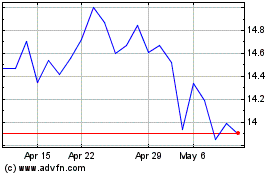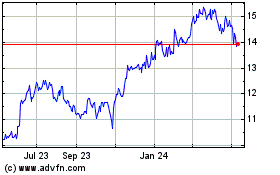Denmark Reopens Money-Laundering Probe -- WSJ
September 21 2018 - 3:02AM
Dow Jones News
By Patricia Kowsmann and Drew Hinshaw
This article is being republished as part of our daily
reproduction of WSJ.com articles that also appeared in the U.S.
print edition of The Wall Street Journal (September 21, 2018).
Danish authorities reopened an investigation into a massive
Russia-linked money laundering scandal at their country's largest
bank, as investors looked to assess the impact after the lender
admitted to letting $233 billion move through a single Eastern
European branch.
The Danish Financial Supervisory Authority, said Thursday that
it would revisit a probe at Danske Bank that it had closed in May,
when it reprimanded the bank and ordered it to set aside $800
million in capital for any risks. The regulator can't directly
impose fines, but it can report its findings to the police and deem
executives unfit. Employees at the bank's Estonia branch are under
investigation by Estonian prosecutors for helping customers from
Russia and other ex-Soviet Union states spirit ill-gotten gains
abroad.
The move by regulators comes after Danske Bank published a
report Wednesday saying employees had failed to run basic
background checks on thousands of customers who lived outside the
Baltic country. Customers often deposited money in cash.
Investigators the bank hired suspect a "large portion" of those
transactions were laundered money, the report said.
U.S. officials have expressed concern that Denmark, a founding
member of the North Atlantic Treaty Organization, didn't do more to
crack down on inflows of illicit Russian wealth at a time of
heightened tensions between Moscow and the West. The report has
embarrassed officials in the Scandinavian country, which is often
ranked among the world's most transparent.
Danish politicians have called for swift punishment for any
employees or executives found to be involved and steeper fines for
such behavior going forward. On Wednesday, Danske Bank's CEO Thomas
Borgen resigned.
Separate from Denmark's banking regulator, prosecutors there are
investigating Danske for alleged money laundering crimes.
"This is a serious case," Danish State Prosecutor Morten Niels
Jakobsen told The Wall Street Journal.
The renewed probe increases pressure on Danske, whose shares
have fallen almost a third this year as the size of the scandal
kept growing bigger. Analysts have estimated fines between $600
million to billions of dollars if the U.S. decides to impose its
own. Analysts say the bank has enough capital to withstand even a
large fine.
The biggest risk, analysts and regulators have said, is that
Denmark's largest bank could be cut off from the global dollar-led
financial system. Under U.S. law, the Treasury has the power to
restrict the flow of U.S. dollars to a foreign bank suspected of
laundering money, a penalty known as the "death blow sanction"
because it often sends lenders into financial collapse. U.S.
authorities can also use threats of that penalty to force the bank
to settle for steep fines.
The Justice Department, Treasury Department, and the Securities
and Exchange Commission are each examining the bank, The Wall
Street Journal reported this month. Danske officials said Wednesday
they aren't aware of any U.S. investigations.
"There's huge uncertainty around the scale of any fines, with
the U.S. being the biggest question mark," Berenberg analyst Adam
Barrass said. Mr. Barrass said the bank has enough capital to
withstand his current estimate of $1 billion.
Danske Bank, one of the 25 largest banks in Europe by assets,
doesn't have a banking subsidiary in the U.S., but does operate a
securities arm there. It also has several U.S. dollar bond issues
that were marketed to U.S. investors. Its stock is traded
over-the-counter an American depository receipt.
Danske Bank's share price rose 4% percent Thursday as some
investors concluded that the bank was unlikely to face stiff
penalties from either Danish or American regulators. The bank has
said it so far as found no evidence that it breached U.S.
sanctions.
But it also hasn't checked some 8,000 clients out of the 15,000
its Estonian branched managed. Nor has it checked who those clients
sent their money to, the bank said Wednesday.
"The problem with the bank is, it's a matter of luck," said John
Byrne, CEO at Corlytics, a regulatory risk intelligence firm. "If
there's any party on a U.S. sanction list that they've processed
transactions for, that's where the trouble starts."
Write to Patricia Kowsmann at patricia.kowsmann@wsj.com and Drew
Hinshaw at drew.hinshaw@wsj.com
(END) Dow Jones Newswires
September 21, 2018 02:47 ET (06:47 GMT)
Copyright (c) 2018 Dow Jones & Company, Inc.
Danske Bank AVS (PK) (USOTC:DNKEY)
Historical Stock Chart
From Mar 2024 to Apr 2024

Danske Bank AVS (PK) (USOTC:DNKEY)
Historical Stock Chart
From Apr 2023 to Apr 2024
